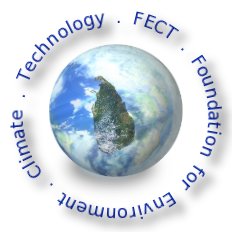Introduction

The environment shapes lives, livelihoods, environment and the economy. It is difficult to overestimate its pervasive impact. The recent Tsunami highlights that many in poor countries do not adequately use science and technology adequately. Indeed, the sciences in the critical environmental technologies are lagging in Sri Lanka and there has been little advantage taken of advances in weather and environmental prediction technologies, advances in computing, satellite imaging and communication technologies. Realizing this, we started a Foundation in 2002 and registered it as a non-profit company in 2003. This builds on the work of the officers in Sri Lanka and internationally. Our work is oriented towards developing useable scientific and technological information that can be applied by users in diverse sectors. We work actively with other Sri Lankan partners in government institutions, Research Institutes and Universities. Our charter limits us from turning private profit but requires us to develop the science and technology field. We seek partners in expanding our work.
Our Past Contributions
Our officers have engaged in projects in Lanka over 10 years that made significant contributions in the demonstration of
- Demonstration science application projects
- Science and Technology Data base development
- Climate and Environmental diagnostic work
- Development of local technological capacity
Current Goals in Disaster Management
Our officers have led projects to identify disaster hazard risk in Sri Lanka in 2002-2004. They published internationally, proposed early warning system and disaster management systems well before the Tsunami. Responding rapidly to the Tsunami they created two Internet Resource Centers for bringing scientific information to the Relief, rehabilitation and reconstruction efforts. Now they seek to leverage all this work with an expanded program.
Current Proposals (Under Development)
- Disaster Risk Identification for Sri Lanka
- Disaster Information Dissemination
- Climate and Rural Energy
- Hydrometeorological Monitoring
- Climate Atlas
- Regional Climate Modeling
- Dynamic Disaster Hazard Identification
- Early Warning Systems for Natural Hazards
- Early Warning System for Dengue Risk
Disaster Risk Identification for Sri Lanka
Natural disasters not only result in death and destruction but also undermine decades of development gains as highlighted by recent examples from Sri Lanka. In the aftermath of these disasters, improved disaster management has been deemed to be urgent by the Government of Sri Lanka. In the past the primary policy response to disasters was to provide emergency relief. It is, however, increasingly recognized that appropriate disaster risk management, including risk assessment, preventive measures to reduce losses and improved preparedness, can help reduce death, destruction and socio-economic disruption.
We propose the establishment of a mechanism to disseminate relevant and accurate expertise to volunteers, community groups and others engaged in disaster relief, rehabilitation and reconstruction. The primary costs that are needed are the establishment of a 4 person office, communication facilities, printers, costs of stationery, mailing, fax and office infrastructure. In addition, we need a few local informants to keep the websites current.
Climate and Rural Energy
Climate information is essential for the planning, design and development of renewable energy resources. Here we propose to conduct the research needed to adapt climate information to the formats which shall be useful for the renewable energy community and to convey it in multiple forms whether it be energy managers, policy makers, designers or scientists and engineers generally. This work shall in this phase be restricted to Sri Lanka and be undertaken by a team that has several years of experience working mainly in the climate sector with some members proficient in the rgy sectors.
About Us
We established a Foundation to promote environmental and climate technology and its applications in multiple fields. FECT was officially registered in October 2003 under a service oriented non-profit charter with the Registrar of Companies, Samagam Medura, No.400, D.R.Wijewardena Mawatha, Colombo 10, Sri Lanka.